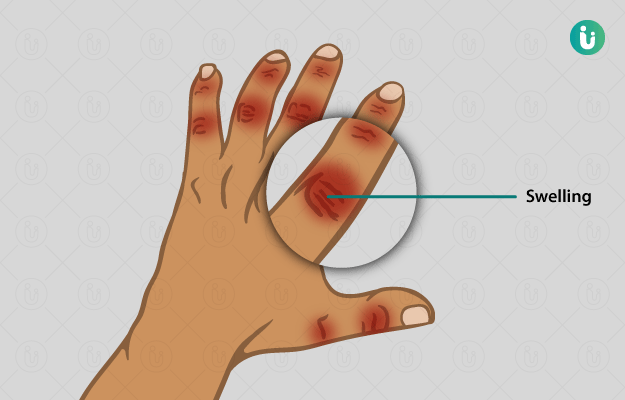What is scleroderma?
Scleroderma is an autoimmune disease involving the connective tissue and the skin. It commonly occurs in association with autoimmune rheumatic diseases. The term scleroderma is self-explanatory, where ‘sclero’ means hard and ‘derma’ means skin.
What are its main signs and symptoms?
Symptoms of scleroderma depend on the affected body part.
Initial symptoms include:
- Thickening and hardening of the skin of the arms, fingers and face
- Swelling and puffiness of the fingers
- Red, swollen hands
- Painful joints
- Morning stiffness
- Fatigue
- Weight loss
- Raynaud’s phenomenon: Loss of circulation in the toes and fingertips, which turn white on exposure to cold
Symptoms that occur eventually include:
- Tissue loss with skin appearing highly coloured
- Calcinosis: Small, localised, hard masses on fingers, forearms or other pressure points
- Raynaud’s phenomenon
- Oesophageal dysfunction
- Sclerodactyly: Skin appears thin, shiny and bright, resulting in decreased function of the fingers and toes
- Telangiectasia: Dilation of blood vessels, which appears as red spots on the surface of the skin
- Raynaud’s phenomenon in later stages results in tingling, numbness or pain sensation in the affected parts
Diffuse scleroderma affects the heart, blood vessels, lungs, kidneys and gastrointestinal organs.
What are the main causes?
The cause of scleroderma is unclear, but it is believed to be caused by an autoimmune mechanism.
It more commonly affects women and occurs in two forms, namely,
- Localised scleroderma
- Diffuse scleroderma
How is it diagnosed and treated?
Scleroderma requires a consultation with a rheumatologist or a dermatologist.
Medical history and physical examination aid in the diagnosis of scleroderma.
A number of tests and investigations help the doctor in assessing and evaluating the disease.
Investigations include:
- Blood tests
- Antinuclear antibody test
- Skin biopsy
Other investigations will be recommended on the basis of the internal organs affected.
Treatment of scleroderma addresses the symptoms and, at best, lessens them.
Your doctor will prescribe medications for relieving heartburn and improving blood circulation.
Medications for reducing the activity of the immune system are found to slow down the progress of scleroderma.
Anti-inflammatory agents and analgesics are useful in reducing joint stiffness, pain and swelling.
Depending on the affected internal organs, medications are prescribed accordingly.
Self-care:
- Wear gloves and socks to avoid fingers and feet being exposed to cold.
- It is beneficial to keep your body clean and skin well-moisturised.
- Try physiotherapy.
- Avoid smoking.

 Doctors for Scleroderma
Doctors for Scleroderma  OTC Medicines for Scleroderma
OTC Medicines for Scleroderma
 Scleroderma articles
Scleroderma articles

 Home Remedies for Scleroderma
Home Remedies for Scleroderma






 Editorial Team
Editorial Team











